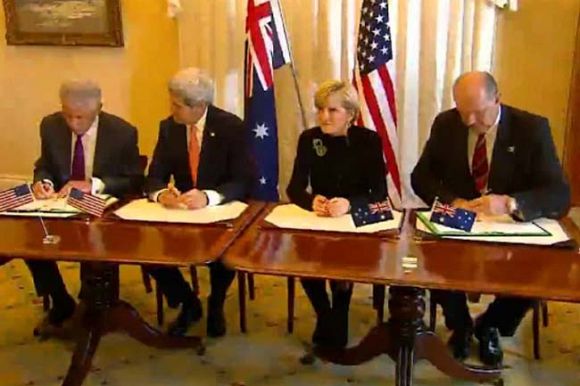The recently delivered '2023 Defence Strategic Review' pits Australia to participate in another 'Great War', writes William Gregory.
LAST WEEK, the Commonwealth Government published the '2023 Defence Strategic Review'. The Review, arguably the most significant of its kind in the 21st Century, was released the day before the commemoration of ANZAC Day, the 108th anniversary of Australian troops landing at Gallipoli. Of the 60,000 Australian soldiers who lost their lives in World War I, 8,159 were in Gallipoli.
ANZAC Day brings Australians together to recognise these and many other service peoples’ sacrifices. Rather than celebrating glorious victories, ANZAC Day calls for sober reflection on the role that Australia has played in wars and that war has played in the lives of ordinary Australians.
With some notable exceptions, particularly repelling Japanese forces from Papua New Guinea and the South Pacific during World War II, the majority of Australian conflicts have been fought in the interests of its imperial patrons: Britain and the United States. A critical reading of the '2023 Defence Strategic Review' indicates that Australia will continue its iron-clad commitment to fighting on behalf of its more powerful allies, even in situations where its own interests are questionable.
While the world wars galvanised the Australian public against the enemies of Britain and later the United States and continue to be celebrated as great victories for Australia’s shared interests with its major allies, subsequent conflicts exist in a more complicated context.
The Vietnam War and more recently the invasions of Iraq and Afghanistan, have divided the Australian populace. The lack of a final victory, despite the immense sacrifice of many Australians in these conflicts, has demonstrated a disconnect between the stated shared interests of Australia and the United States and the actual interests of ordinary Australians. Rather than learning from the 60,000 senseless deaths during World War I, Australia has continued to commit itself to foreign wars against foes who have posed no direct threat.
In August last year, Prime Minister Anthony Albanese and Defence Minister Richard Marles commissioned a review of the Australian Defence Force (ADF) to understand its preparedness for changes in regional security. Delivered on 14 February 2023 and published on 24 April, the '2023 Defence Strategic Review' calls for vast changes to the ADF force structure and posture.
These recommendations centre around a proposed transition away from the “defence of Australia” concept that was focused on minor regional threats to security and towards “national defence”, a whole-of-government policy that prioritises 'the defence of Australia against potential threats arising from major power competition'. No longer avoiding pointing to Beijing as the supposed source of Australian insecurity, the report claims 'China-United States competition is the defining feature of our region and our time'.
The Review paints a clear picture: China is the major threat to Australia. And the ADF are not currently prepared to address this threat.
What the Review fails to articulate is why China poses a threat to Australia. The Review is full of references to protecting Australia’s “northern approaches” while framing “major powers” as the key threat to Australian security, but these recurrent ideas are never causally linked. The “strategy of denial” is put forward as a way Australia can protect itself from aggressors, a doctrine that aims to 'defend against and defeat, an act of aggression'.
But why would Australia have to deny a Chinese act of aggression through its northern approaches? Fears of an "Asian invasion" have been prevalent in Australia since the 19th Century, framing the country as a vast and wealthy land insufficiently protected by its small Anglo-Saxon population against attacks from "vast hordes" to the country’s north.
Like the racially based fearmongering of the past, the '2023 Defence Strategic Review' obscures the reality in which a threat by China against Australian security is founded by failing to question the merits of the American alliance that is bringing the country closer to conflict.
The Australia-U.S. security relationship, codified in the ANZUS Treaty and bolstered by the recent AUKUS agreement, is acknowledged in the Review as the basis of Australian security policy. The Review states 'contrary to some public analysis, our Alliance with the U.S. is becoming even more important', but falls short of providing any evidence to back up this assertion.
Tensions between the U.S. and China are undoubtedly rising and while the U.S. is a close Australian ally, China is its largest trading partner.
The Review sees Australia’s current ideological similarities with the U.S. as trumping its relationship with China, claiming 'Australia has a fundamental interest in protecting our connection to the world and in the global rules-based order upon which international trade depends' without explaining how Australia can continue to escalate tensions with China alongside the U.S. while maintaining its economic relationship with China.
It is the purchaser of 36.4 per cent of Australian exports in 2021, according to the Department of Foreign Affairs and Trade.
The '2023 Defence Strategic Review' does place an increased importance on continental defence, domestic manufacturing and a more rigorous capability acquisition process, but its central thesis of refocusing the ADF on preparing for conflict with China continues to tie Australian security to decisions made in Washington.
Instead of seeing national defence as a policy of protecting against what the Review acknowledges as 'a remote possibility' of invasion, or against cyber and infrastructural attacks from hostile states, the focus remains beyond our borders.
On the day before ANZAC Day the Albanese Government published this Review in which it has agreed, or agreed in principle, to every recommendation, preparing the nation for a military reshuffle that centres another great war as a looming possibility in Australia’s future, without any concomitant diplomatic or economic strategies that centre cooperation and mutual benefit as dampers on rising tension.
William Gregory is an undergraduate student of Politics and International Relations. His interests are in Australia's relation to the American Imperialism, Indo-Pacific security, and modern world history.
Related Articles
- AUKUS cements U.S. interests and endangers Australia's security
- 'Red Alerts', the spectre of communism and the cold winds of war
- China scare campaign bad news for Australia
- 'Red Alert' is a paper tiger
- Ballooning paranoia: The China threat hits the skies
 This work is licensed under a Creative Commons Attribution-NonCommercial-NoDerivs 3.0 Australia License
This work is licensed under a Creative Commons Attribution-NonCommercial-NoDerivs 3.0 Australia License
Support independent journalism Subscribe to IA.













